Leadership Development Research: Survey reveals critical gaps in leadership development
The latest TalentLMS research explores gaps in leadership development. Discover 7 key areas where companies are missing the mark, including internal talent development, succession planning, and leadership training.

Key highlights
Leadership development falls short
45% of managers say their company isn’t doing enough to develop future leaders.
Leadership training on the back burner
Leadership training tops the list of lacking initiatives for effective leadership development.
Ineffective leadership on the rise
36% of managers have witnessed ineffective leadership in their company often or consistently.
- Seven blind spots in leadership development
- #1 Leadership training
- #2 Utilizing internal talent
- #3 Transparent promotions
- #4 Leadership skill gaps
- #5 Mentorship from execs
- #6 Expanding perspectives
- #7 Growth opportunities
- Sizing up leadership
- Leadership’s well-being
- Employee development
- Succession planning
- Conclusion
- About the survey
Leadership development survey: Summary
Ongoing disruptions and rocky markets are turning up the heat on organizational leaders. On top of that, The Great Unbossing trend is thinning out middle management, piling on the pressure.
Yet, leadership development initiatives are lagging.
In light of looming uncertainty and shifting leadership paradigms, the latest TalentLMS research took the pulse of leadership development. Are companies doing enough to support their leaders?
Turns out, they’re not. With only 4 in 10 executives saying their company has high-quality leaders, the leadership crisis may be unfolding before us.
But that’s just the tip of the iceberg.
The new TalentLMS research exposed a gap in leadership training and preparedness. It revealed that 45% of managers in U.S. companies say their company isn’t doing enough to develop future leaders. Moreover, leadership training emerged as the most neglected initiative for building leadership capabilities.
“My company is doing enough
to develop future leaders.”
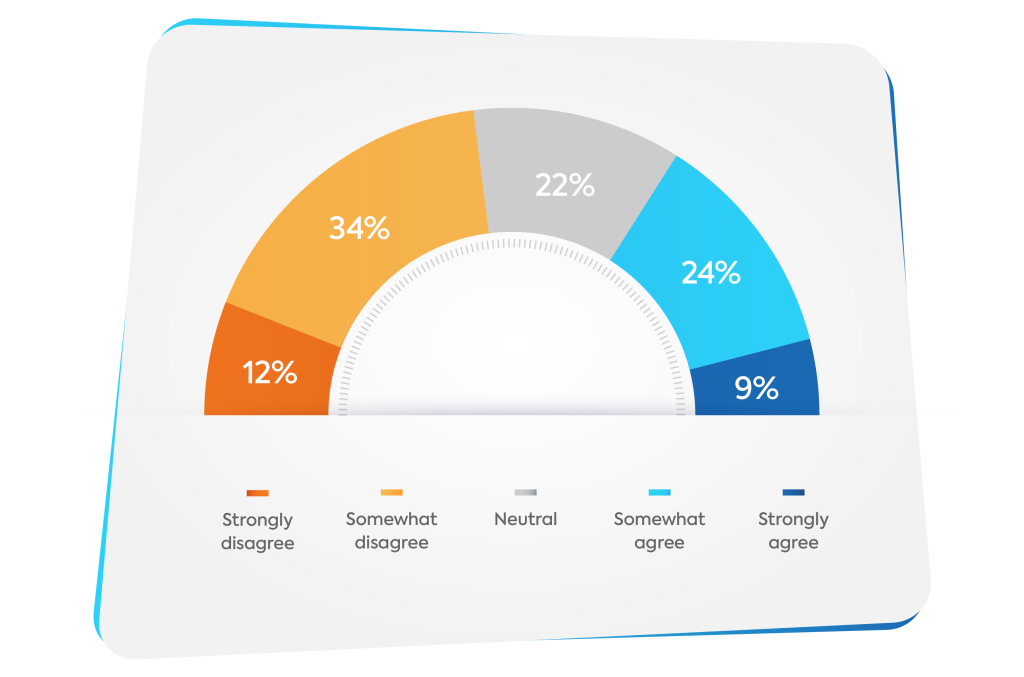
Still, it’s not all downhill. The survey unveiled mixed sentiment: Initiatives for nurturing leaders are hitting some marks while missing others. On the upside, more than half (53%) of surveyed managers say their leaders lead by example.
So, what’s the catch? Let’s delve into the data from all angles to find out.
Seven blind spots in leadership development: Where companies are missing the mark
Leadership development gaps are hitting companies hard. Our survey pinned down the specific areas where companies are not measuring up.
To uncover blind spots, we asked managers which initiatives their companies lack in terms of leadership development. The distribution of responses across categories was revealing, yet concerning, as only 8% selected “leadership development initiatives in my company are effective.” This goes to show that despite the efforts (or lack thereof), there is a broad dissatisfaction when it comes to leadership training across organizations.
Only 8% of managers think their company’s leadership development initiatives are fully effective, with 92% pointing to different areas that need improvement.
Next, let’s see which specific programs are underdelivering. The following graph outlines which initiatives the surveyed managers consider insufficient.
Key initiatives companies lack
for effective leadership development
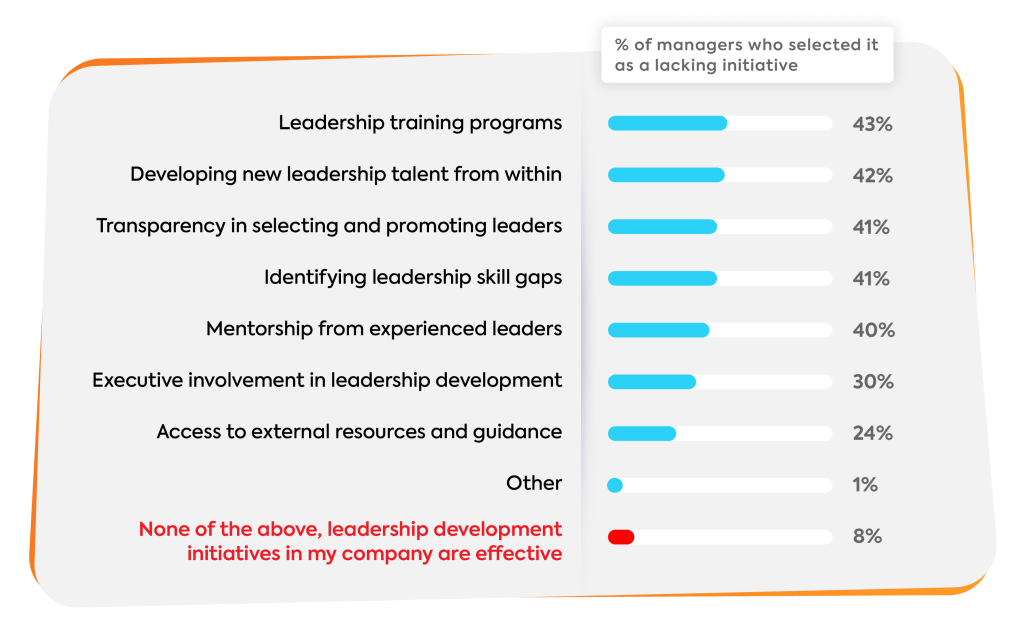
#1 Leadership training programs
Turns out, leadership training is the top-ranking missing initiative. Why is this a problem? Because without consistent and effective training, leaders stop growing. This directly impacts their ability to inspire, guide, and manage teams. When leadership skills stagnate, this creates a ripple effect: Decisions falter, teams become disengaged, and the company is less adaptable. Without a solid foundation of leadership training, companies risk creating a leadership void that’s hard to fill. And even harder to recover from.
Managers voted leadership training as the top lacking initiative for effective leadership development.
What’s more, there’s a deeper issue at play. Many companies focus their leadership training on top performers or senior executives. The result? This leads to a leadership development paradox—those who most need leadership training don’t get it. When training is limited to a select few, it creates a skill deficit across the organization.
This approach leaves a large portion of employees behind—those who might benefit most from learning and development opportunities. As we’ve seen in the introduction, our survey backs this up: 45% of managers say their company puts insufficient focus on developing future leaders.
While the data unpacked striking shortcomings in leadership training programs overall, the evaluation of training resources received mixed reviews. Although 42% of managers are satisfied with the training resources aimed at helping them become better leaders, 33% are dissatisfied (while the rest remain neutral).
This level of dissatisfaction makes it clear that companies need to step up the quality of their leadership training resources.
#2 Internal talent development
Developing leaders from within is the second most lacking initiative for effective leadership growth. As the previous graph shows, 42% of surveyed managers believe this vital practice is neglected in their organizations.
And the problem doesn’t stop there. Forty-three percent of managers say their companies are hiring new managers more often than developing them internally.
What happens when internal talent is overlooked?
43% of managers say their companies are hiring new managers more often than developing them internally.
Companies risk demotivating their existing workforce. Moreover, they fail to cultivate leadership that’s already aligned with the organization’s goals and culture, ultimately leading to leadership deficiency. Promoting from within doesn’t just strengthen loyalty—it’s a strategic investment in long-term success and future preparedness.
#3 Transparency in promotions
Transparency in promotions ranks as the third most missing initiative for leadership development, reflecting a broader workplace trend. As organizations focus more on clarity in career paths, unclear promotion processes can undermine these efforts.
Why?
Employees expect fairness and open communication about career progression. Without it, frustration and mistrust take root. Transparent promotion pathways aren’t optional—they’re essential for building trust. And trust is the foundation of impactful leadership.
#4 Identifying leadership skill gaps
Pinpointing the weak spots in leaders’ skills is yet another shortfall: 41% of managers flagged it as overlooked in their companies. This is troubling because when leaders fall short in key areas, the entire organization feels the impact.
In another question, we asked the managers which abilities their leaders need improvement in, and these are the top 3 responses*:
1. Embracing feedback
2. Leading by example
3. Demonstrating self-awareness and empathy
*Note: We’ll be analyzing these findings further in the “Sizing up leadership” section of our report.
All of these skills are critical for building trust and driving team performance. If these shortages in leaders’ competencies aren’t identified and dealt with, organizations risk weakening and disorienting their teams.
#5 Mentorship from experienced leaders
Four in 10 managers said another initiative their company is underperforming in is providing mentorship from experienced leaders. This leaves leaders without valuable guidance and points to a lack of succession planning. Plus, the leaders that do provide mentorship, don’t seem to be doing it effectively.
Another finding backs this up: 38% of surveyed managers are dissatisfied with how well their current leaders are mentoring the next generation of leaders.
38% of managers are dissatisfied with how well their current leaders are mentoring the next generation of leaders.
Mentorship is essential for grooming future leaders. Experienced leaders don’t just offer advice—they share hard-earned wisdom and guide new talent through challenges. Without this support, leaders are left to navigate on their own.
What’s more, managers want more involvement from the top. Three in 10 flagged executive involvement in developing leaders as a lacking initiative in their organizations.
#6 Access to external resources and guidance
Close to a quarter of managers (24%) identified access to external resources and guidance as a missing element in their company’s efforts to nurture leadership growth. Showing they’re missing out on professional growth tools, such as executive coaching programs, mastermind groups, cutting-edge industry reports, and more.
This raises an important question: Are organizations stuck in their own ways, missing the chance to stay attuned to the bigger picture?
Constant exposure to new perspectives is vital for leaders’ agility. Without it, they’ll miss out on getting a pulse on new viewpoints and ideas; along with staying connected to broader trends and emerging opportunities.
The ability to have strategic foresight into evolving market dynamics is non-optional for modern executives. By embracing fresh insights, leaders can enrich their vision and strategy. And most importantly, they can expand their ability to anticipate changes and keep their organization ahead of the curve.
#7 Leadership development opportunities
In addition to identifying where companies lag behind, our survey also gauged the satisfaction with offered leadership development opportunities. As seen in the following graph, managers’ views are split, with satisfaction slightly outweighing dissatisfaction.
How satisfied are you with the
leadership development opportunities your company offers?
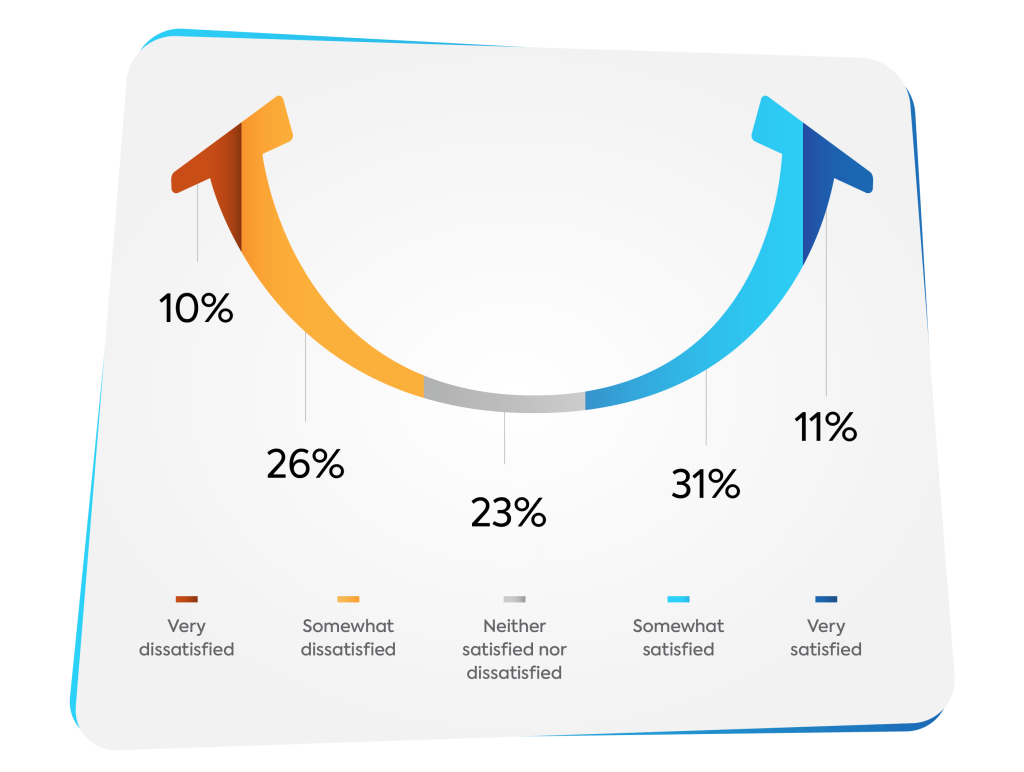
Over a third of surveyed managers, 36%, are dissatisfied with the opportunities for leadership development in their companies.
At the same time, a larger part, 42%, is satisfied, stating that they believe their companies are on the right track. The rest took a neutral stance, suggesting mixed or uncertain experiences. This split reflects a broader trend: While some organizations are making strides in building leadership capabilities, many are still underperforming.
Finally, 40% of managers are satisfied with how democratized access to learning and development is in their companies. Leaving 24% dissatisfied and the rest having no stance.
Sizing up leadership: Leading by example or falling behind?
Aside from looking at how companies grow their leaders, our survey also put a spotlight on leadership in action. Do leaders have well-rounded skills? Are they inspiring trust and empowering others?
The results paint a mixed picture.
The findings on leadership competence don’t look promising. The data tells the story of widespread ineffective leadership. As illustrated in the following graph, 36% of managers witness poor leadership in their company often or consistently.
How often have you witnessed ineffective leadership
in your current company?
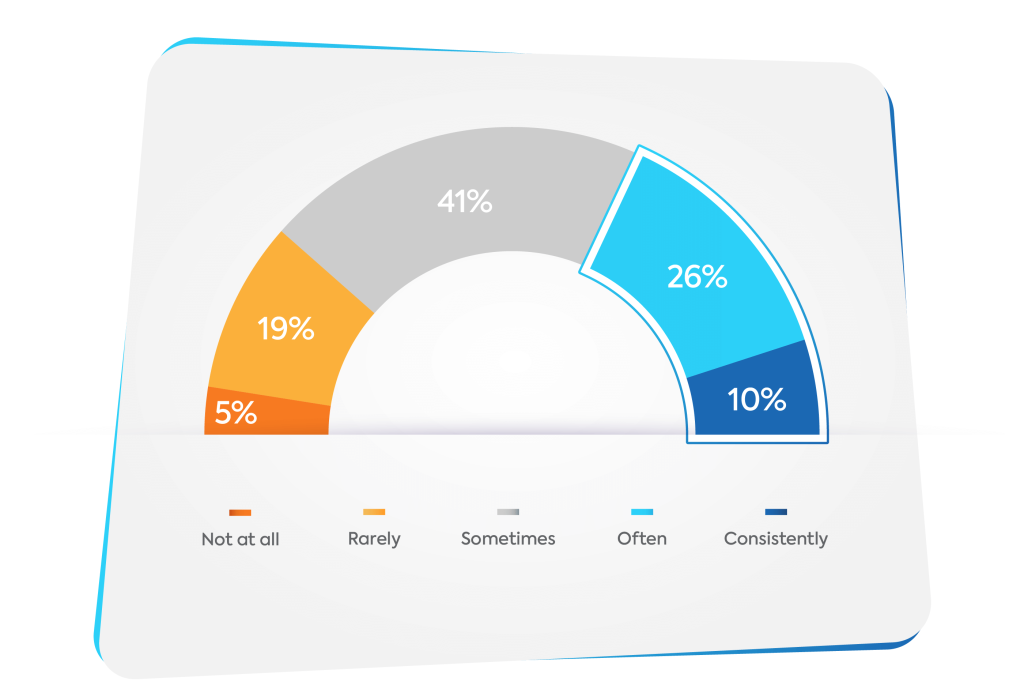
To better understand where leadership is slipping up, we asked managers which key abilities their leaders lack. Their responses highlighted critical shortcomings in areas such as feedback, adaptability, and inspiring trust.
What’s troubling is that only 12% of managers think the leaders in their company are well-rounded and effective. Meanwhile, an overwhelming majority is pointing to areas needing improvement.
The following graph breaks down the areas where leaders are not measuring up. Which skill is at the top of the list? Willingness to embrace feedback and learn from mistakes. This highlights a critical flaw. Without accepting feedback and adapting, leaders can’t grow. As a result, they are holding back both themselves and the company.
Key abilities leaders are lacking
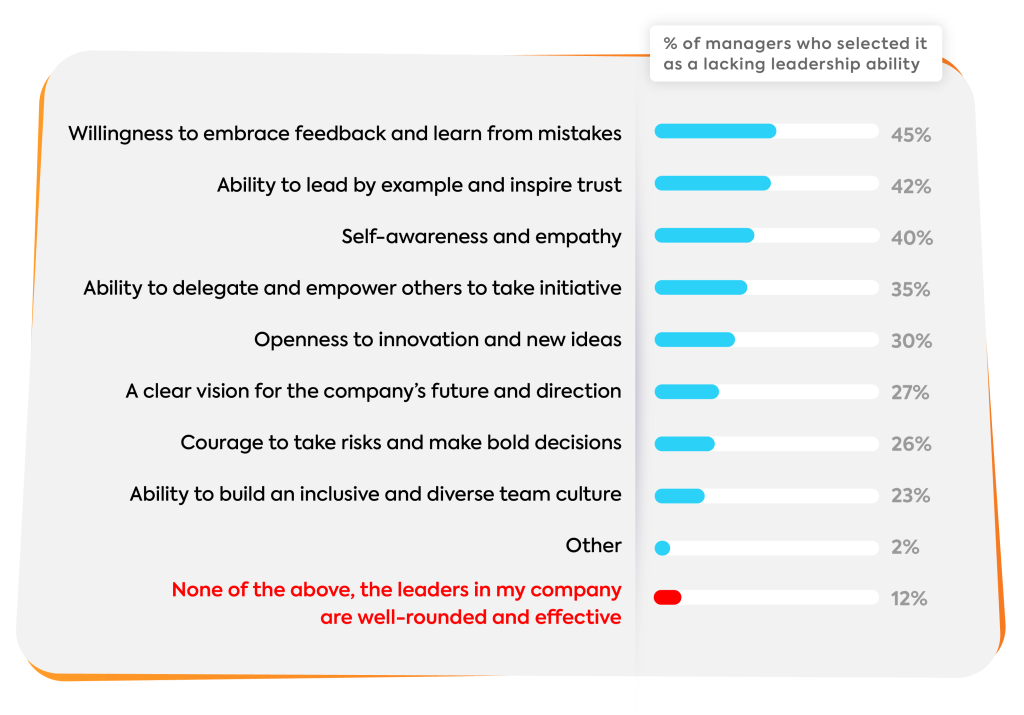
Managers also flagged that leaders are not showing an ability to lead by example and inspire trust, placing it as the second most common area for improvement. Having this ability sets the tone for team dynamics and creates a culture of accountability. Without it, leaders struggle to build credibility and motivate their teams.
Next on the list—the third top-voted missing skill—is self-awareness and empathy. These skills are fundamental for leaders to tune into their teams and make others feel seen. Without them, leaders risk creating disconnect and alienation. Trust erodes, and with it, the motivation that drives high performance.
But that’s not the whole picture. Here’s where it gets interesting.
In another survey question, we asked managers if they think their leaders lead by example. And in an unexpected twist, the majority responded positively. Despite the deficiencies spotted above (!), 53% of managers still agree that their company’s leaders lead by example. That’s a paradox worth exploring. How can leaders be seen as strong role models yet fall short in so many areas?
Willingness to embrace feedback and learn from mistakes is the #1 skill that leaders lack.
This contradiction underpins that leaders may model the right behaviors in some ways, but they don’t apply them consistently. It’s one thing to lead by example in visible actions. But it’s another to inspire trust, embrace feedback, and empower others.
Leaders might be “walking the walk” on the surface. However, cracks appear when it comes to the deeper qualities that impact teams.
Leadership’s well-being: Can leaders find balance?
Our survey shed light on a long-standing debate: Can leadership be sustainable without sacrificing personal time?
Here’s what the data revealed.
Over a third of managers (33%) said that becoming a leader has hurt their work-life balance. While 44% haven’t felt this impact (and the rest remained neutral), a significant portion still signals a deeper issue. The pressure to deliver results and manage teams is taking its toll on some.
What’s more, 42% of managers feel their companies are now investing less in employee well-being than they did during the pandemic. This can have consequences. Without prioritizing wellness, even the strongest leaders could stumble. The message for the employers is clear: Support for leaders at all levels shouldn’t be overlooked.
Is employee growth taking a back seat?
A 2023 study by Harvard found that improving employee engagement and productivity is one of the top three goals that organizations aim to achieve through developing leaders.
Turning the spotlight from leaders and managers, the TalentLMS survey zeroed in on how the uncovered blind spots impact the very foundation of any organization—its employees. After all, effective leadership isn’t just about guiding teams. It’s about driving growth, engagement, and satisfaction across the entire workforce.
So, what does the employee experience look like through the lens of managers?
To find out, we asked them if they are satisfied with support and resources for employee growth and development in their companies. Close to half (47%) of managers are satisfied. However, 31% expressed dissatisfaction, and the rest were neither satisfied nor dissatisfied. This suggests that while many companies are getting it right, according to managers, there’s still a notable gap in support for employee growth.
Next, we asked managers if their company puts profit over employee experience. The results were telling. A significant 44% disagreed that their company’s leaders prioritize employee experience over profit. Demonstrating discontent with the lack of focus on employee growth, development, and support in favor of revenue.
44% of managers disagree that their company’s leaders prioritize employee experience over profit.
On the positive side, 30% of managers think their leaders do prioritize employee experience over profit. This shows that some companies recognize the value of employee well-being as a driver of long-term success. The remaining 26% were neutral, highlighting uncertainty around where company priorities truly lie.
Succession planning: Are new leaders well prepared for future challenges?
The ability of leaders to mentor and prepare the next generation is the foundation of effective leadership. Yet, our findings reveal a sharp divide in how managers view their company’s leadership development efforts. While some see progress, many believe that current leaders aren’t doing enough to empower future talent and equip it for upcoming challenges.
Let’s dive in.
How satisfied are you with how well your company’s leaders
are mentoring the next generation of leaders?
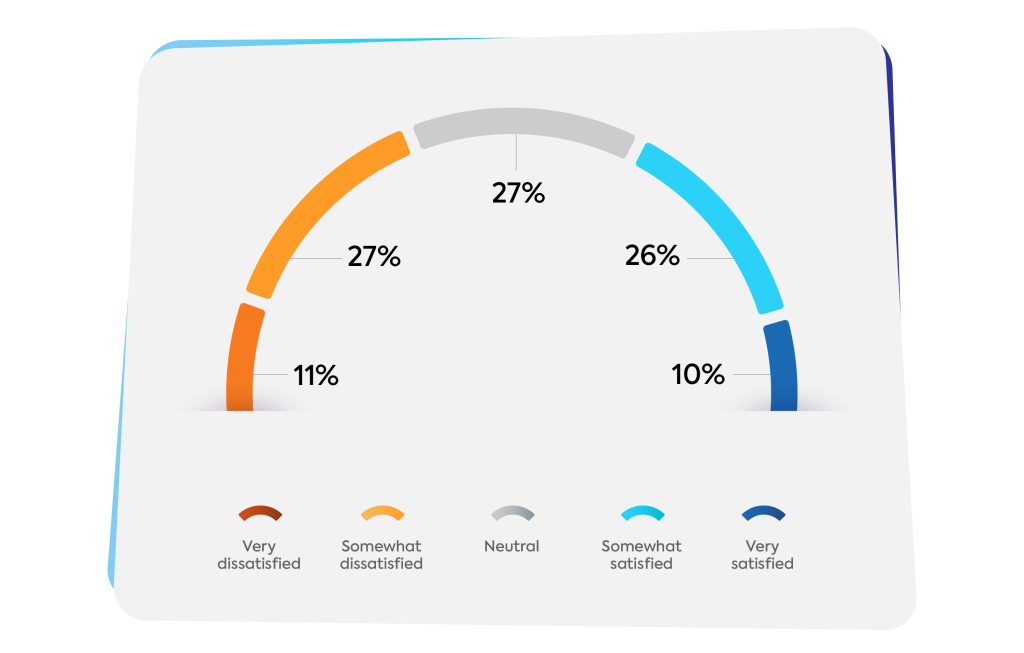
The graph above shows that 38% of managers are dissatisfied with how well their current leaders are mentoring and empowering the next generation of leaders. On the positive side, 36% express satisfaction, indicating that while some companies are making strides, it’s far from universal. And the rest took a neutral stance.
The split persists when it comes to preparing leaders for future challenges. A third of managers (33%) feel their companies aren’t doing enough to prepare leaders for future challenges. While a larger share, 39%, think the efforts are hitting the spot and the remainder is neutral.
There’s a sense of uncertainty among a sizable portion of managers. Many still don’t feel confident in their company’s approach to preparing leaders for the future.
The question remains: Are companies doing enough to ensure their leaders are ready for what’s next, or is this divide a sign of deeper leadership issues?
One positive finding (also seen in the internal talent development section above), stands out—43% of managers say their company identifies future leaders based on potential, not just high performance. This underscores that a larger share of companies are looking beyond the surface. They are recognizing the value of nurturing potential rather than relying solely on achievements. However, with 29% disagreeing and the rest staying neutral, it’s clear there’s still room for improvement.
Future-proof your organization with skills-based training
Unlock your teams’ full potential with TalentLMS.
Sign up in seconds, test the platform forever, upgrade whenever.
Conclusion
At its core, leadership development focuses on preparing leaders for future challenges. Even when it’s unclear what those challenges will be. To navigate ambiguity, organizations need leaders who are truly ready for everything.
Leadership isn’t just about managing the present. It’s about preparing for what’s coming.
To navigate ambiguity, organizations need leaders who are truly ready for everything.
The findings of the TalentLMS survey are loud and clear: Leaders need development tools, training, and resources that equip them to navigate uncertainty and mentor the next generation. They need support in refining their adaptability, emotional intelligence, and self-awareness.
These qualities are make-or-break in today’s leaders.
The pressure is on. It’s time to step up and equip leaders for what’s coming.
Especially when the only certainty is uncertainty.
About the survey
The survey was conducted online on October 10, 2024, and included 600 managers across industries in the U.S. Minor discrepancies in total figures may occur due to rounding.
Research team
Ana Casic, Marialena Kanaki, Giota Gavala.
More workplace research by TalentLMS
Train your people. Measure results. Drive growth.
TalentLMS gives you the tools to supercharge every step of your training.


